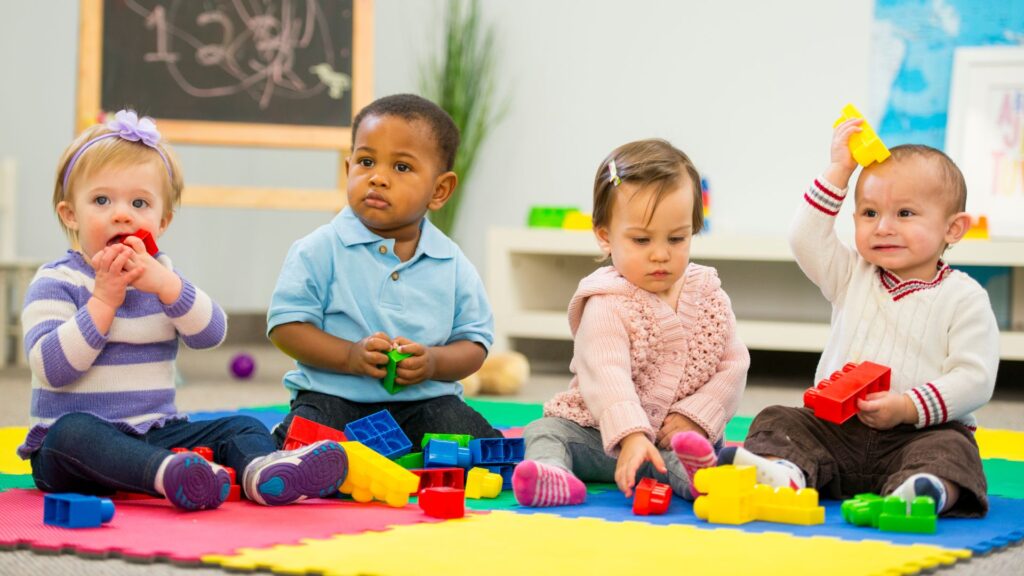
A New Baby Is the Beginning of All Things
In a word, a baby’s mind is incredible. They are inquisitive and have an innate desire to learn. A baby’s brain will more than double in size during its first year, with over a million new connections being made between neurons every second. This extraordinary mental growth, however, cannot be prompted by nature alone. The brain’s underlying structure, upon which all subsequent learning is dependent, is built by a mix of genetics and the infant’s experiences. Babies pick up knowledge from their surroundings and experiences. Babies need all of their senses to explore their environment, so we make sure our nursery rooms are filled with stimulating sights, noises, and textures.
Babies’ feeling of body and balance are just as important as their five senses, so we spend a lot of time on the floor with them, encouraging them to roll, crawl, climb, and cruise. Infants need playtime as a motivation to try new things, learn new things, and solve problems. Every learning curve, regardless of age, is motivated when they are presented with a question they find intriguing, exciting, or entertaining.
When kids feel like they have a place and are accepted for who they are, they are free to explore, experiment, and develop into their full potential. Thus, infants may be ‘asking’ very straightforward questions, yet the answers we choose to these inquiries shape not just who they are now, but also who they will become.
Keep reading to learn more about the wisdom behind the value of activities with your child, as shared by Sirwiss’s network of specialists.
Fun Activities to Stimulate Your Little One’s Growth
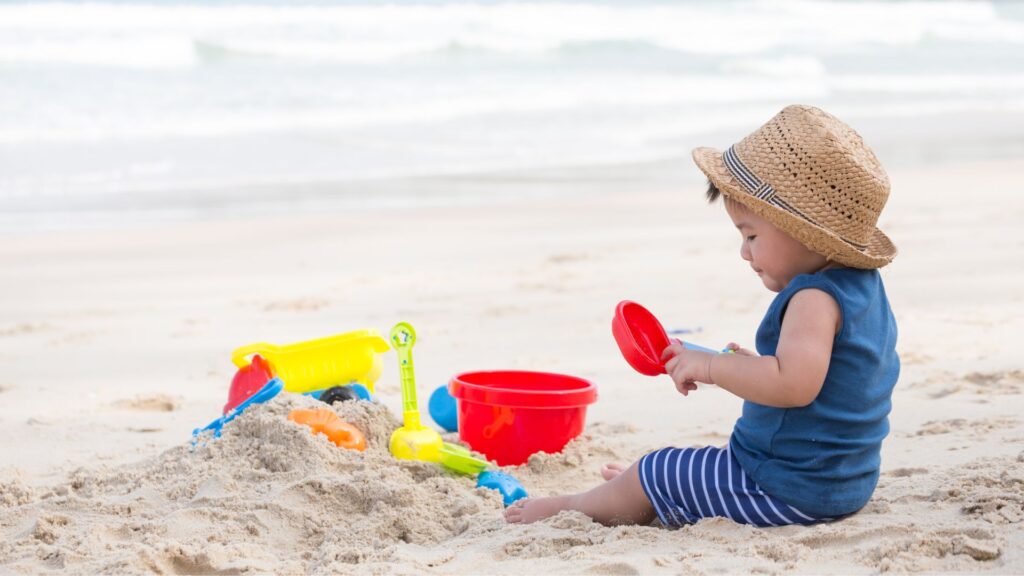
Learning via play is one of your baby’s most crucial tasks during his or her first year. It may appear to be just for fun and games, but play is critical for your child’s social, emotional, physical, and cognitive development. Each experience is an opportunity for them to use their senses to learn about their body and the world. Parents may join in the fun – these baby games are a terrific way to help your child learn and grow.
- Play When Your Baby Is Happy and Rested. Make a point of stopping when they’ve had enough. Children have varying stimulation thresholds. It’s time to take a break if yours appears bored, fussy, or exhausted.
- Let Your Baby Play Alone. You may be your baby’s favorite person, but they do not require you to play with them constantly. Your baby may benefit from some “alone time” while you work on another task nearby. Place them in a safe area on the floor with toys nearby, or on a play mat with hanging toys that they can kick with their feet.
- Think of “Toys” More Broadly. If you’ve ever seen a newborn entranced with a cardboard box, you know how babies can find entertainment in nearly anything. Allow your child to smash pots and pans in the kitchen or dump water from plastic cups in the bathtub.
- Add Fun to Your Daily Routine. Every encounter you have with your baby can be full of learning and enjoyment, from playing “This Little Piggy” with their toes while changing their diaper to singing songs while they splash in the tub. During these ordinary interactions, your baby will enjoy playing.
- Don’t Fear Boredom. Our hectic, modern lifestyles might deprive children of the leisure time that is essential for learning via play. let for downtime in your infant’s day whenever possible and use these quiet periods to let your baby to play.
Best Games for Babies

Games to Play with Newborns (Birth To 3 Months)
Newborns can’t play like older babies just yet, so your best chance of connecting with them is to engage their senses of touch, sight (remember, your newborn can’t see very far), smell, and hearing. It may take your newborn several seconds to respond to you, or they may not respond much at all. Be patient – you may need to wait until they enter an alert, responsive state.
Slow Dance
Hold your infant and dance to soothing music. Small newborns like leisurely swinging on their shoulders. Later, they may love being rocked. (Provide head support.) Bonding helps your baby learn. When your arms tire, set your baby down and continue dancing for your tiny audience. Playing with your infant is fun.
Show and Tell
Your infant is acquiring head-eye coordination in these early months. Show-and-tell with a board book, stuffed animal, or rattle can help develop this skill. Hold one of these objects in front of your infant when they’re awake and responsive. Move it carefully so they can see it. You’re refining their vision!
Story Time
Strat reading to your infant early. Reading daily boosts linguistic skills. Your infant is acquiring language by listening to you, even if they don’t understand the story. Routines provide security, and babies’ brains develop best in a loving setting. However, older babies may grab the books and close them. All normal. Babies adore books and cuddling, but they don’t care about the plot.
Funny Faces
Newborns learn a lot by watching and copying others. They’ll copy you even as babies. Your infant may try making faces at you, which you can turn into a game. Smile or put your tongue out at their level. You’ll see them copying. Make funny sounds too. Before babies can repeat them, teach them animal sounds, songs, goofy laughs, and car noises. Copycat activities can teach your kid verbal skills.
Sing-along
Your baby doesn’t know your dreadful voice! Release your inner diva now. Your infant may appreciate everything you sing but learn the classics. Add “Itsy Bitsy Spider,” “The Wheels on the Bus,” “Row, Row, Row Your Boat,” “Head, Shoulders, Knees, and Toes,” and “Patty-Cake” to your repertoire. Learn hand moves too! As your youngster sings, you will too. “Old Mac Ethan had a farm,” “Kate is my sunshine, my only sunshine,” etc. Try songs featuring goofy sounds or animal noises, like “Witch Doctor” or “How Much Is That Doggie in the Window?” Sing with a hand puppet or a napkin or sock. Singing to your child is joyful and educational. Your baby learns the language and prepares to speak by listening to you sing.
Games to Play With 4-month-old to 6-month-old Babies

At this age, your baby will become a lot more physical, rolling over both ways and even sitting up. Games can get more active now, too. Your baby might enjoy “pony rides” on your knee or tickle games. They’re also more responsive to you, making noises and meeting your eyes.
Super Smells
While making dinner, your baby starts crying. Show them the cinnamon spice rack. Apply some to your baby’s nose. (Don’t get it in their eyes or mouth.) Try others: Your infant may like the scent of vanilla, peppermint, cumin, cloves, nutmeg, and other herbs and spices. Shaving lotion and hand cream smell too. Sniff everything wonderful, but don’t feed your baby. “What’s that smell?” might assist your infant link their senses to the surroundings. Once your baby is ready for solid foods, presenting them to diverse flavors and spices and seasonings will widen their taste palette.
Narrate Your Day
Don’t be shy—your baby loves to hear your voice. While making lunch or cleaning, describe what you’re doing. Describe the weather or items you see while walking. While shopping, name goods on shelves. Even though your infant can’t respond, your chatter is helping. Language development begins in utero and continues daily. Your baby learns to speak by listening to you.
Bubbles Everywhere
Your baby may now focus on bubbles, which are magical. Blow bubbles to calm them. Blow bubbles in the tub, park, or front porch. Bubbles are cheap, portable, and endlessly fascinating for babies. Watching bubbles float helps babies develop eye-tracking skills. Babies will like watching what happens to each bubble they strike at this age.
This Little Piggy
Touch your baby’s toes in turn, starting with the big toe. Say, “This little piggy went to market, this little piggy stayed home, this little piggy had roast beef, this little piggy had none. And this little piggy went wee-wee-wee all the way home.”
Airplane
Hoist your baby to strengthen their upper body now that they can hold their head up. Fly them over you and make rocket noises to pretend they’re rocket ships. Pretend your infant is on an elevator that jerks up level by floor before plummeting. Pretend your baby’s reporting helicopter traffic. Watch out for your child dropping their head on yours, which hurts a lot. Playing airplane may appeal to your strong-armed child. Rest their hands on your shins while reclining on your back. “Fly” your infant with your legs.
Games to play with 7-month-old to 9-month-old babies
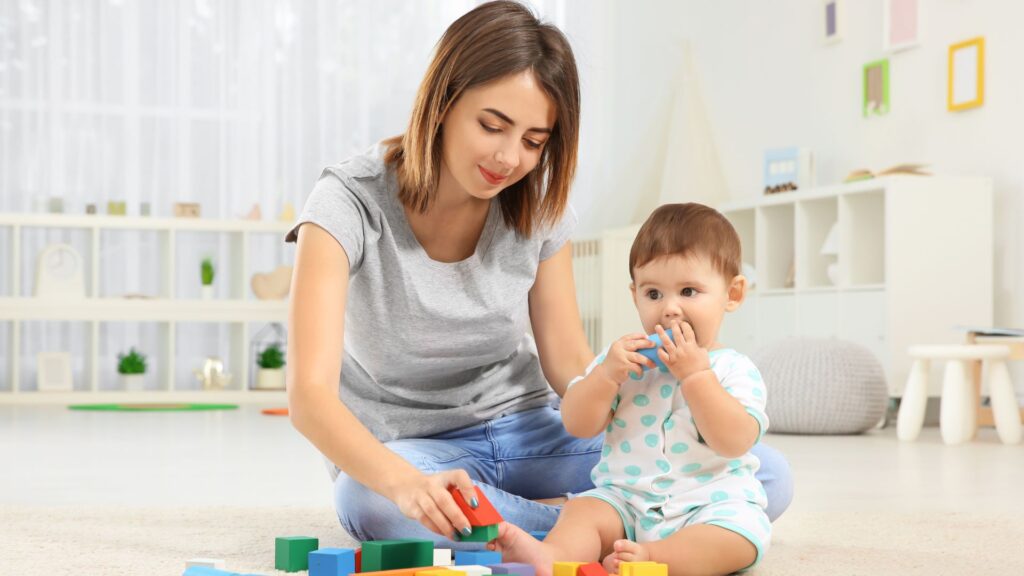
Your baby’s becoming an expert at sitting and may soon be crawling as well. Encourage these physical feats by celebrating each new milestone with applause and a cheer.
Band Practice
Your baby bangs one object on the table. If they have two objects, they might slam them together, hold them up to the light, squint at them, bang them separately on the table, hit the table with both at once, see if the object sounds different when hit with the left or right hand, and so on. Give them hollow pots, wooden spoons, or bells. Your baby’s loudness is just the beginning. Babies are learning cause and consequence. They test what will happen by banging an item against a table.
Obstacle Course
Once your baby’s crawling, they may enjoy the challenge of having to move over things. (This is great for developing their motor skills, too.) Couch pillows, empty boxes, and piles of laundry make good obstacles. Just make sure to supervise your baby so they don’t get stuck under or in anything.
Peek-a-boo
Your baby now knows that when an object disappears, it’s still there. This discovery makes peek-a-boo popular. Cover your face with your hands or a blanket, then shout “peek-a-boo!” I see!” Repeat until baby stops laughing. This game is infinitely customizable. Pop out from behind a chair or out of your baby’s sight. Hide a stuffy and say “peek-a-boo.” Or hide hats behind the couch and appear wearing a new one each time. Put a low-cut hat on your head and let your infant take it off, shouting “Oh!” each time. (You’ll never wear a hat again.)
Roll Play
Babies are fascinated by balls and how they move. You’ll get a big laugh by juggling or tossing balls up in the air and letting them hit the floor while you make a silly sound effect: “Whoops!” Roll a soft ball toward your baby and watch them grab and squeeze it. Around 9 months old, babies start learning how to roll a ball back toward you. They might not get it at first, but with practice, they’ll figure out how to send the ball back your way.
Games to play with 10-month-old to 1-year-old babies
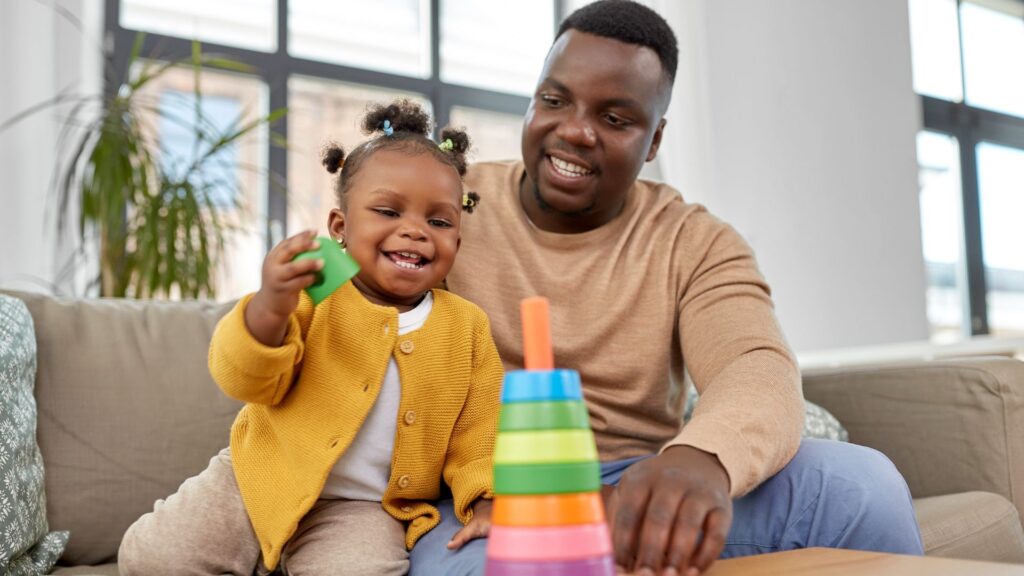
Developmentally, your baby has suddenly morphed into an almost toddler. Games that allow them to practice gross motor skills such as standing and cruising are important for them now. Your baby will also enjoy working on their fine motor skills by fiddling with the tag on your shirt or the pages of a book.
Home Organizer
Your baby makes connections. They’ll love stacking, arranging, filling, and emptying. Show your baby how to put and take objects out of a shoe box. Alternative game play: Show your infant how to pour water, sand, or cornmeal from one cup to another or into a bigger container with several cups. Baby’s fine motor skills are developing. Toy stacking, gripping, and moving games can help toddlers learn this.
Cruising Practice
Once your baby is up on their feet, you can encourage “cruising” (walking while holding on to things for balance). Place a favorite toy at the far end of the couch or over on the coffee table. Try enticing your baby by putting one of your toys, such as your sunglasses, a distance away and cruising on your knees toward it. Your baby may find this amusing and attempt to join you. Your baby may enjoy pushing an object around the room, like a push toy or a large, empty box.
Water Play
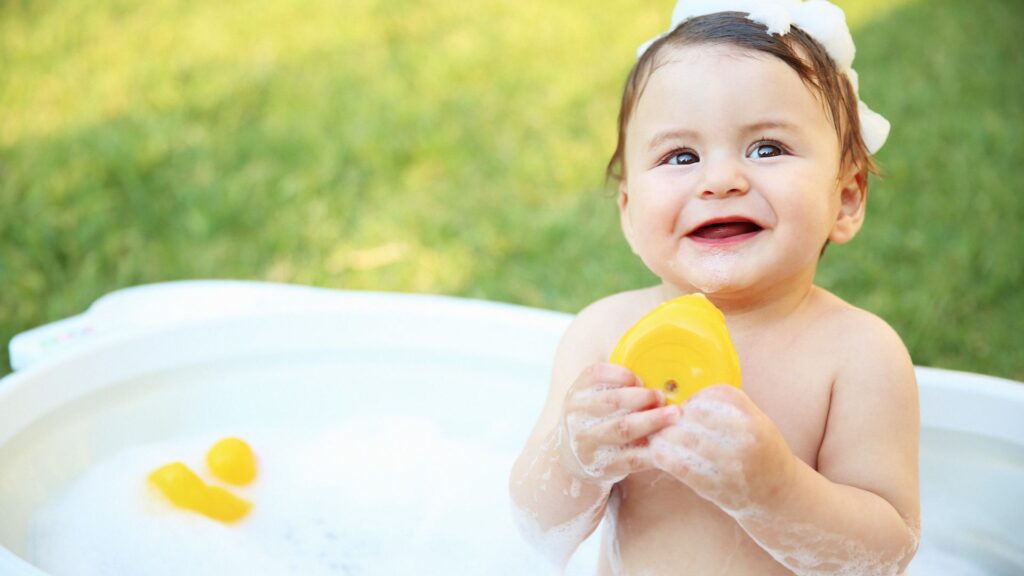
Fill the tub with toys to encourage your baby’s play. A lot of things around the house can be filled, drained, poured from or into, and floating indefinitely. Bring in some plastic cups, yogurt containers, funnels, and squeeze bottles, as well as any of your baby’s favorite bath toys. Your infant is still learning about cause and consequence at this age. Filling and draining bath toys are only one of the numerous experiments your little scientist may conduct.
Infants have an innate need to explore and discover the world. The physical, mental, and social growth of a young child can be greatly aided by playing games with them. As a parent, you may be curious about the finest kind of baby games to play with your child. To aid with your baby’s development and keep them engaged, we have collected a list of some of our favorite games for babies.